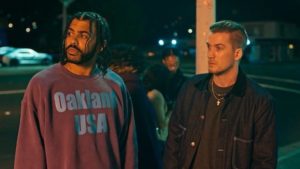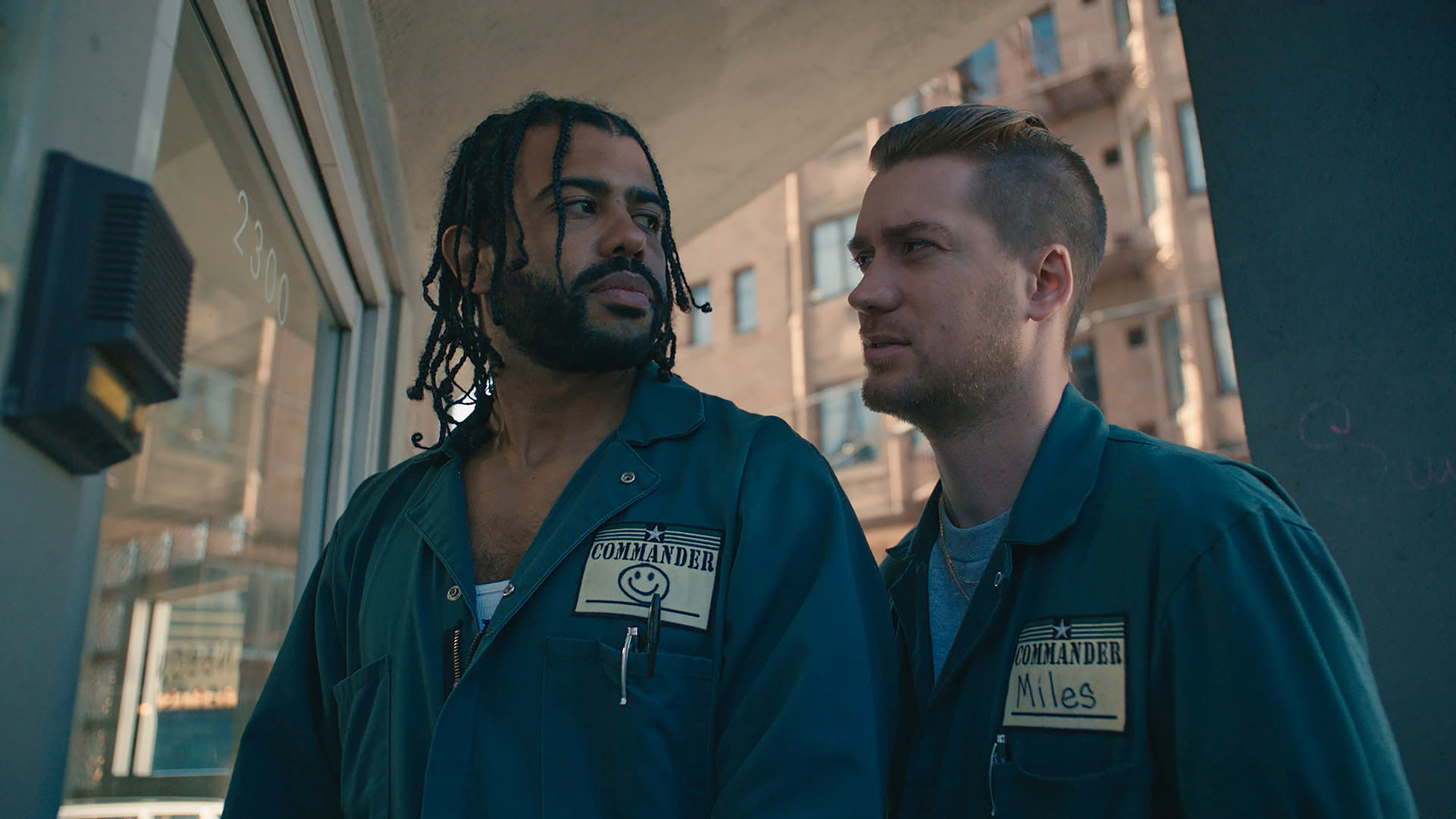Did I just see the best film of 2018? You won’t believe me if I told you there was no local bias. In fact, I wouldn’t believe me, either. So, I’m pointing out up front that Blindspotting is the Oaklandest Oaklandy Oaktown Oaklandish film I can think of, and that includes Sorry to Bother You. This film couldn’t be more Oakland if you caught it blasting Tower of Power while cruising down International Boulevard (formerly East 14th) wearing a custom Rickey Henderson Atléticos jersey, discussing lunch at Pho 84, the Black Panthers, and using the word “Hella” to refute the words of Gertrude Stein. So, yeah, I’m a little biased, and yet I feel confident in stating without an ounce of hyperbole that I’ve seen over 150 theater films in 2018 to date (thank you, MoviePass, may you live another week) and I have seen no better film in that run than Blindspotting.
Collin (Daveed Diggs) is a convicted felon. That’s enough for many people. The fact that he’s black, wears braids, and was convicted of a violent crime will do it for many more. And that’s exactly the point. Alone, Collin is soft-spoken, responsible, and a man clearly aiming to shed his labels. Every morning, he jogs in a cemetery (the same one where my grandparents are buried, FWIW); every day, he drives and lifts for Commander Moving. He can’t leave Alameda County; he has an 11 PM curfew, and he has three days until his probation is up — it’s not unlike a twist on the “three days until retirement” police-officer standard.
Collin’s best friend Miles (Rafael Casal) is white. That’s enough for many people. As if daring us to reconsider, Miles is into slang, gun violence, and impulsive behavior. He has a body of angry art and a silver grill in his mouth. If anyone is going to get Collin in trouble, it’s Miles, and it’s probably going to happen in these three remaining days. And yet, Miles is a loving husband and proud father of an adorable four-year-old. Think you know the Blindspotting story? Just watch. Miles is decidedly reckless and dangerous, but he’s also loyal and attentive. This is what it looks like when you draws characters as real humans, not just categorizations.
Coming home on night one, the big event happens … yet the event has none of the consequences we imagine. Collin stops the Commander truck at a light and nearly flattens a fleeing man too scared to realize traffic jeopardy. Within seconds, the man is gunned down by an Oakland police officer. Collin is the only witness to the tragedy. And the cop stared straight back at him. Now, you would think this shooting would dominate the rest of the movie, right? Not at all. Collin immediately reasons that -as a convicted felon- his testimony in the matter would be rejected out-of–hand and he might even be sent back to prison is the blowback. He’s absolutely right. And so the movie happens with the incident simmering in the background, never letting it dominate anything but Collin’s private thoughts. This is what it looks like when you draw plots as real, not just ways of contriving action.
Collin’s ex-girlfriend Val (Janina Gavankar) is responsible for the film title. In my favorite bit of exposition this movie year, Val –a future psychological profiler- creates the term “Blindspotting” to describe the phenomenon of “Rubin’s Vase,” an ambiguous black and white design in which the viewer can see either symmetrical white faces or a black face in the negative space. Or do the faces comprise the negative space? What you perceive can come entirely from what you bring to the table, and you may not even perceive both perspectives until you have a mind open enough to see both realities existing in the same space. This is the outward act of discovering your own metaphorical blind spot. The metaphor is easily translated to show how we define Collin, Miles, or the cop (Ethan Embry), but is just as applicable to the understanding between Collin and Val. While Miles badmouths Val every chance he gets, Collin understands the girl who dumped him isn’t an enemy, but perhaps a key component in putting his life right. This is what happens when you acknowledge relationships as complex animals, capable of their own influence and path, rather than two-dimensional and easily defined.
Did I mention that Blindspotting is drop-dead funny in certain places? One doesn’t expect that of a film involving a police shooting, huh? I almost laughed myself silly when the  film pans out for the shot of an absurd Uber vehicle or the aftermath of Miles selling second-hand curling irons in a beauty salon. I haven’t even gotten to half the things I loved about this film: You can close your eyes and listen to Blindspotting for language alone. It’s no accident that writers/stars Casal and Diggs are poets by trade. OTOH, you could also turn the sound off and enjoy the cinematography by itself. This is not just my love of Oakland talking; there are a handful of visuals in this film I won’t be forgetting … ever. This is what happens when you actually create art instead of wondering what it takes to sell a film.
film pans out for the shot of an absurd Uber vehicle or the aftermath of Miles selling second-hand curling irons in a beauty salon. I haven’t even gotten to half the things I loved about this film: You can close your eyes and listen to Blindspotting for language alone. It’s no accident that writers/stars Casal and Diggs are poets by trade. OTOH, you could also turn the sound off and enjoy the cinematography by itself. This is not just my love of Oakland talking; there are a handful of visuals in this film I won’t be forgetting … ever. This is what happens when you actually create art instead of wondering what it takes to sell a film.
Faithful readers of the blog (both of you) know I’m fairly shy when it comes to doling out the stars. 2018 has been far more rule than exception. While there have been a number of films I would happily laud like Eighth Grade, Won’t You Be My Neighbor?, and A Quiet Place, there hasn’t been a single one I’d call a masterpiece. Until now. Blindspotting immediately joins Do the Right Thing and American History X on the list of the greatest race relation films of my lifetime, and that’s not even the best part of the film.
Within the streets of Oakland there’s a spree
Of life, love, and art, to a degree
Yet one thing I must share
A treat that seems rare
The makers of this film rhyme better than me
Rated R, 95 Minutes
Director: Carlos López Estrada
Writer: Rafael Casal, Daveed Diggs
Genre: Exploring stereotypes
Type of being most likely to enjoy this film: An Oakland resident
Type of being least likely to enjoy this film: I imagine the “Blue Lives Matter” crew will say they didn’t get a fair shake.



